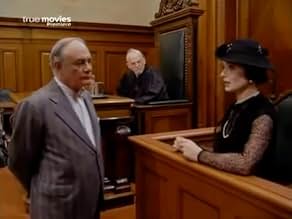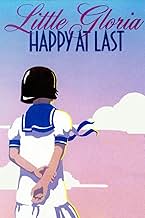IMDb RATING
7.3/10
898
YOUR RATING
The story deals with Gloria Vanderbilt's difficult coming-of-age when, at eleven, she was a pawn in a custody battle between her sybaritic mother and her aunt.The story deals with Gloria Vanderbilt's difficult coming-of-age when, at eleven, she was a pawn in a custody battle between her sybaritic mother and her aunt.The story deals with Gloria Vanderbilt's difficult coming-of-age when, at eleven, she was a pawn in a custody battle between her sybaritic mother and her aunt.
- Nominated for 6 Primetime Emmys
- 7 nominations total
Browse episodes
Featured reviews
This movie was very well done. Lucy Gutteridge did a wonderful and believable portrayal of Gloria Morgan Vanderbilt. You can feel her pain as you follow along. The actress who played little Gloria looked just like Gloria Laura Vanderbilt which helped to make her credible. Angela Lansbury was also amazing as Gertrude Vanderbilt, I ended up disliking her by the end of the movie (which is rare for this actress). Definitely see this movie.
"Little Gloria...Happy at Last" is a 1982 miniseries and a clear indication that they just don't make TV movies like they used to. For one thing, the miniseries is gone; for another, since no murder was committed, this type of story is no longer of interest to producers. One thing it might have going for it today - it is true.
The miniseries is based on the Barbara Goldsmith book covering the custody battle between Gloria Morgan Vanderbilt and Gertrude Hay Whitney for Gloria Vanderbilt, who was 11 at the time. According to Goldsmith's excellent book, the insecure Little Gloria's fears of being kidnapped were fed into by her deeply religious nurse, Dodo, and vengeful grandmother, Laura Fitzpatrick Morgan while her mother traveled and she visited with her Aunt Gertrude. With all the talk done in front of her about the Lindbergh kidnapping and other copycat crimes, Gloria came to fear her own mother would kidnap and kill her. Never asked to explain the origins of her fears or what they exactly were, Gloria was then paraded in front of doctors and prescribed all sorts of things for her upset stomach and night terrors. Gertrude eventually refuses to return Gloria to her mother, starting an enormous court case, scandal and publicity.
This opulent film is wonderfully acted, beautiful to look at and engrossing, with a top cast including Lucy Gutteridge as Gloria's mother, Angela Lansbury as Gertrude Whitney, Christopher Plummer as Reginal Whitney, Gloria's father, Glynis Johns as Laura Morgan, Maureen Stapleton as Dodo, Jennifer Dundas as Little Gloria, John Hillerman, Martin Balsam, Michael Gross and Barnard Hughes. One more star: Bette Davis as Alice Gwynne Vanderbilt, Little Gloria's grandmother. The casting of Lansbury as Davis' daughter is inspired! The entire cast, as one may imagine, is magnificent.
The story of Little Gloria, today mother of Anderson Cooper, is heartbreaking and shows not only how the power of money continues to corrupt the legal system but the pathetic way that children were raised and treated in our society in the 1930s. Much is made of Gloria's mother traveling and living away from her daughter as if she was the only one doing it; in reality, most wealthy people handed their children to nurses and took off for months at a time. Though Gloria was assigned a guardian, no one unbiased ever talked to her, and doctors were too glad to take the Vanderbilt money, prescribe her laxatives and keep her out of school. You can't count the judge (who was a patient at a mental hospital); he was pro-Vanderbilt and concerned only with Gloria's religious upbringing, not the undue influence she had been under because of her nurse. One's sympathy is with Gloria's inept, confused, passive, overwhelmed mother, who was not a mean-spirited woman, just someone who knew only one way to live. Gertrude, perhaps at first well-meaning, emerges as someone who used her money to buy the justice she needed by getting the help of Mrs. Morgan and the nurse.
A really wonderful movie. Don't miss it.
The miniseries is based on the Barbara Goldsmith book covering the custody battle between Gloria Morgan Vanderbilt and Gertrude Hay Whitney for Gloria Vanderbilt, who was 11 at the time. According to Goldsmith's excellent book, the insecure Little Gloria's fears of being kidnapped were fed into by her deeply religious nurse, Dodo, and vengeful grandmother, Laura Fitzpatrick Morgan while her mother traveled and she visited with her Aunt Gertrude. With all the talk done in front of her about the Lindbergh kidnapping and other copycat crimes, Gloria came to fear her own mother would kidnap and kill her. Never asked to explain the origins of her fears or what they exactly were, Gloria was then paraded in front of doctors and prescribed all sorts of things for her upset stomach and night terrors. Gertrude eventually refuses to return Gloria to her mother, starting an enormous court case, scandal and publicity.
This opulent film is wonderfully acted, beautiful to look at and engrossing, with a top cast including Lucy Gutteridge as Gloria's mother, Angela Lansbury as Gertrude Whitney, Christopher Plummer as Reginal Whitney, Gloria's father, Glynis Johns as Laura Morgan, Maureen Stapleton as Dodo, Jennifer Dundas as Little Gloria, John Hillerman, Martin Balsam, Michael Gross and Barnard Hughes. One more star: Bette Davis as Alice Gwynne Vanderbilt, Little Gloria's grandmother. The casting of Lansbury as Davis' daughter is inspired! The entire cast, as one may imagine, is magnificent.
The story of Little Gloria, today mother of Anderson Cooper, is heartbreaking and shows not only how the power of money continues to corrupt the legal system but the pathetic way that children were raised and treated in our society in the 1930s. Much is made of Gloria's mother traveling and living away from her daughter as if she was the only one doing it; in reality, most wealthy people handed their children to nurses and took off for months at a time. Though Gloria was assigned a guardian, no one unbiased ever talked to her, and doctors were too glad to take the Vanderbilt money, prescribe her laxatives and keep her out of school. You can't count the judge (who was a patient at a mental hospital); he was pro-Vanderbilt and concerned only with Gloria's religious upbringing, not the undue influence she had been under because of her nurse. One's sympathy is with Gloria's inept, confused, passive, overwhelmed mother, who was not a mean-spirited woman, just someone who knew only one way to live. Gertrude, perhaps at first well-meaning, emerges as someone who used her money to buy the justice she needed by getting the help of Mrs. Morgan and the nurse.
A really wonderful movie. Don't miss it.
Watching Little Gloria forthe first time what struck me about this film is how the
women were totally running the show. Old Commodore Vanderbilt may have made the family fortune from the New York Central Railroad, but by the 20s and
30s the women were certainly running the show.
The only male Vanderbilt is Christopher Plummer playing Reginld Vanderbilt and he's a wastrel just wasting away. In his 40s he marries Lucy Guttridge and the marriage lasts long enough to produce Little Gloria our subject. Plummer dies from the excesses of a partying life Prohibition spirits no doubt helped.
Jennifer Dundas plays Little Gloria the heir to a trust fund set up by her grandfather who wisely knew Plummer would blow it. But when he dies Dundas becomes the center of a custody battle between Guttridge who has a hedonistic lifestyle in Europe and Plummer's sister Angela Lansbury.
This was a good mini-series which even had an appearance by Bette Davis playing Plummer and Lansbury's mother the Vanderbilt grand dame. But the appearances I liked were that of Maureen Stapleton the nurse who poisoned Little Gloria's mind against her mom and Glynis Johns who was Guttridge's mother and quite the character herself.
All this was entertainment fodder for the Depression masses. Little Gloria certainly captures the mood of the times.
The only male Vanderbilt is Christopher Plummer playing Reginld Vanderbilt and he's a wastrel just wasting away. In his 40s he marries Lucy Guttridge and the marriage lasts long enough to produce Little Gloria our subject. Plummer dies from the excesses of a partying life Prohibition spirits no doubt helped.
Jennifer Dundas plays Little Gloria the heir to a trust fund set up by her grandfather who wisely knew Plummer would blow it. But when he dies Dundas becomes the center of a custody battle between Guttridge who has a hedonistic lifestyle in Europe and Plummer's sister Angela Lansbury.
This was a good mini-series which even had an appearance by Bette Davis playing Plummer and Lansbury's mother the Vanderbilt grand dame. But the appearances I liked were that of Maureen Stapleton the nurse who poisoned Little Gloria's mind against her mom and Glynis Johns who was Guttridge's mother and quite the character herself.
All this was entertainment fodder for the Depression masses. Little Gloria certainly captures the mood of the times.
I remember seeing this one weekend years back, and really thought the story was cruel. The film portrays the custody battle of young socialite Gloria Vanderbilt, legend in the world of fashion design, and the possible ramifications of this emotional turmoil.
The thing that struck me about this movie was that it didn't feel like a movie. It was technically very competent, but didn't move well. There were props, there were costumes, there were sets, even one or two locations (though I seem to recall that most of the movie was comprised of interior shots), but there was little in terms of moving the story along, and less action.
Most of the film, from what I recall, was comprised of emotional vignettes. Like they were episodes out of a TV series as opposed to a feature film. Now that I've found this entry on the IMDb I understand that this was a made for TV movie, which makes a little more sense. Even so, not that I know that and it explains my viewing experience, I can't say that I would recommend this film nor call it good. It struck me as a movie made about a wealthy individual's childhood. A story that had emotional ups and downs, but otherwise wasn't much different than any other custody battle except that it involved the rich and famous.
And I guess that's what gets me about this film. For all of its gloss the basic tale wasn't anything more than a glitzed up version of "Kramer versus Kramer" or a made for TV movie thereof. We see suggestive tawdry details, but we're not really privy as to whether they're actually true or not. And that's the other thing that holds back this film; you don't know how much truth there is on either side of the trial. So, as a viewer, what do you do with that? I endured it, and sat through it, but to be exceedingly honest, I wish I had tuned it out.
I can't recommend this film in any capacity unless you're into the whole custody battle thing, and like stories about rich and famous people's childhoods. It's visually rich in terms of the shots that are there, and you do sympathize with young Gloria as her family tears itself asunder, but if this had been a couple in a trailer park, or a couple living out in rural or mountainous America, would you still find it interesting? If it had been a couple in India, Bhutan, outer Mongolia, Portugal, Brazilian Amazon, would you still tune in and sit through it? Of course you wouldn't.
I saw it once, and once was enough. To be fair it's an okay movie for what it is, but the entire production felt like it could have been more in terms of material portrayed, as well as trimmed down in terms of length.
Give it a shot.
The thing that struck me about this movie was that it didn't feel like a movie. It was technically very competent, but didn't move well. There were props, there were costumes, there were sets, even one or two locations (though I seem to recall that most of the movie was comprised of interior shots), but there was little in terms of moving the story along, and less action.
Most of the film, from what I recall, was comprised of emotional vignettes. Like they were episodes out of a TV series as opposed to a feature film. Now that I've found this entry on the IMDb I understand that this was a made for TV movie, which makes a little more sense. Even so, not that I know that and it explains my viewing experience, I can't say that I would recommend this film nor call it good. It struck me as a movie made about a wealthy individual's childhood. A story that had emotional ups and downs, but otherwise wasn't much different than any other custody battle except that it involved the rich and famous.
And I guess that's what gets me about this film. For all of its gloss the basic tale wasn't anything more than a glitzed up version of "Kramer versus Kramer" or a made for TV movie thereof. We see suggestive tawdry details, but we're not really privy as to whether they're actually true or not. And that's the other thing that holds back this film; you don't know how much truth there is on either side of the trial. So, as a viewer, what do you do with that? I endured it, and sat through it, but to be exceedingly honest, I wish I had tuned it out.
I can't recommend this film in any capacity unless you're into the whole custody battle thing, and like stories about rich and famous people's childhoods. It's visually rich in terms of the shots that are there, and you do sympathize with young Gloria as her family tears itself asunder, but if this had been a couple in a trailer park, or a couple living out in rural or mountainous America, would you still find it interesting? If it had been a couple in India, Bhutan, outer Mongolia, Portugal, Brazilian Amazon, would you still tune in and sit through it? Of course you wouldn't.
I saw it once, and once was enough. To be fair it's an okay movie for what it is, but the entire production felt like it could have been more in terms of material portrayed, as well as trimmed down in terms of length.
Give it a shot.
They don't make miniseries like this any more. Superb all star cast playing interesting historical characters in a straightforward clear and detailed way. Better than a lot of newer series that muddle things with non linear plots and focus on the obscure and salacious.
Here the reasons for the custody battle financial and otherwise are clearly explained.
Lucy Gutteridge plays the too young widow who gallivants through Europe. Angela Lansbury plays Gertrude Vanderbilt Whitney of the Museum game the aunt who alongside the nasty money faced Mother sues for custody of little Gloria. Supporting cast are so well cast including Christopher Plummer as the Father who died.
The sets and mansions are sumptuous. The trial is riveting. Along with Poor Little Rich Girl this one is just superb.
Lucy Gutteridge plays the too young widow who gallivants through Europe. Angela Lansbury plays Gertrude Vanderbilt Whitney of the Museum game the aunt who alongside the nasty money faced Mother sues for custody of little Gloria. Supporting cast are so well cast including Christopher Plummer as the Father who died.
The sets and mansions are sumptuous. The trial is riveting. Along with Poor Little Rich Girl this one is just superb.
Did you know
- TriviaIn reality, Gloria Morgan Vanderbilt and her sister Thelma were identical twins. Lucy Gutteridge, who plays Gloria Morgan Vanderbilt in this TV movie, later played Thelma in The Woman He Loved (1988).
- GoofsThe voiceover at the end states that Gloria Morgan Vanderbilt died in 1964. She in fact died in February 1965.
- ConnectionsFeatured in The 35th Annual Primetime Emmy Awards (1983)
- How many seasons does Little Gloria... Happy at Last have?Powered by Alexa
Details
- Release date
- Countries of origin
- Language
- Also known as
- Kleine Gloria - Armes reiches Mädchen
- Filming locations
- Production companies
- See more company credits at IMDbPro
Contribute to this page
Suggest an edit or add missing content

Top Gap
By what name was Gloria ou la course au bonheur (1982) officially released in Canada in English?
Answer


































